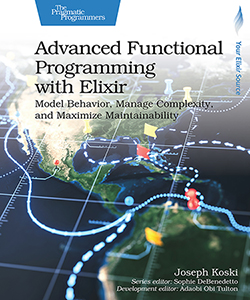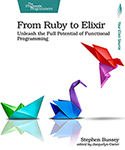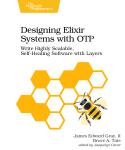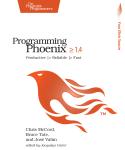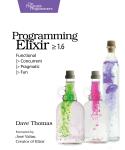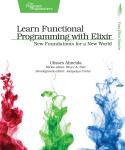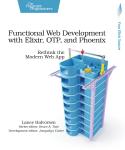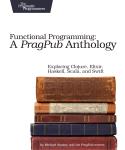About This Title
Pages: 250
Published: January 2026
ISBN: 9798888651797
In Print

Advanced Functional Programming with Elixir
Model Behavior, Manage Complexity, and Maximize Maintainability
by Joseph Koski
Combine advanced functional programming concepts with production-ready Elixir and proven domain-driven design techniques to write cleaner, more thoughtful software. You’ll explore foundational ideas like equality, ordering, predicates, monoids, and monads—then go beyond syntax as you develop intuition for composing logic, modeling behavior, and growing systems. With a focus on maintainable, declarative code over theory, you’ll gain practical, composable patterns you can apply right away.
eBook Formats:
PDF for desktop/tablets
epub for Apple Books, e-readers
mobi for Kindle readers
Get all eBook formats here for $30.95 (USD)
Paperback Formats:
Order via Bookshop (U.S. Only)
Please support indie bookstores!
Find indie bookstores in the U.S. Find indie bookstores around the world.
Get ready to manage crowds, adjust priorities, and keep everyone safe in FunPark, a place that never sits still. Your job is to model that complexity and build the systems that keep everything running smoothly, even as the business team is still figuring out what they want and the experts keep rewriting the rules.
Using core abstractions—equality, ordering, predicates, monoids, and monads—you’ll break problems into small, composable pieces that are both well-behaved and easy to combine. Rather than getting bogged down in theory or formal proofs, you’ll dive into real-world Elixir—using protocols, structs, and pattern matching to express shared behavior across your domain. Along the way, you’ll build the vocabulary and mental models you need to organize complex logic, supported by a production-ready open-source library you can use, extend, and explore in your own projects.
Whether you’re an Elixir developer mastering functional programming or a functional programmer exploring Elixir, you’ll discover how to write code that’s easier to reason about—and create systems that stay understandable, even as they grow.
What You Need
To follow along with the examples in this book, you’ll need Elixir version ~> 1.16, access to the interactive shell (iex), and a code editor that supports Elixir syntax—such as Visual Studio Code, Neovim, or any editor you’re comfortable with. You won’t need Phoenix or any additional setup; the examples are minimal and self-contained, so you to focus on functional concepts without configuration overhead. If you’re unsure how to install Elixir, see the official instructions at elixir-lang.org.Resources
Releases:
Contents & Extracts
- Introduction

- How This Book Works
- Who This Book Is For
- Online Resources
- Conventions Used In This Book
- Build FunPark: Model Real-World Data
- Define the Ride Model
- Implement Fast Passes for Priority Access
- Model the Patrons
- Speak the Language
- What We’ve Learned
- Implement Domain-Specific Equality with Protocols
- Polymorphic Equality
- Implement Equality for FunPark Contexts
- Equality Is Contextual
excerpt

- Transform Inputs Before Matching
- Harness Equality for Collections
- What We’ve Learned
- Create Flexible Ordering with Protocols
- Define Order with a Protocol
- Implement Order for FunPark Contexts
- Transform Inputs Before Comparison
- Harness Order for Collections
- Reverse the Order
- Reduce Repetitive Code with Macros
- What We’ve Learned
- Combine with Monoids
- Define the Protocol
- Combine Numbers with Sum
- Combine Equality
- Combine Order
- Generalize Maximum
- Manage Complexity
- What We’ve Learned
- Define Logic with Predicates
- Simple Predicates
- Combine Predicates
- Predicates That Span Contexts
excerpt

- Compose Multi-Arity Functions with Curry
- Harness Predicates for Collections
- Model the FastPass
- Fold Conditional Logic
- What We’ve Learned
- Compose in Context with Monads
- Build the Monad
excerpt

- Model Neutrality with Identity
- What We’ve Learned
- Build the Monad
excerpt
- Access Shared Environment with Reader
- Build the Structures
- Monad Behaviors
- Avoid Prop Drilling
- Dependency Injection
- Shared Configuration
- What We Learned
- Manage Absence with Maybe
- Build the Structures
- Fold Branches
- Lift Other Contexts
- Bridge Elixir Patterns
- Define Equality
- Establish Order
- Lift Custom Comparisons
- Model Absence in a Monoid
- Implement the Monadic Behaviors
- Refine Lists
- Filter Within Composition
- What We’ve Learned
- Model Outcomes with Either
- Structure of Either
- Validation
- From Bind to Combine
- Make Errors Explicit
- What We’ve Learned
- Coordinate Tasks with Effect
- Build the Effect
- Deferred Transformation
- Effectful Store
- Maintenance Repository
- Inject Behavior, Not Configuration
- Flip the Logic
- What We’ve Learned
- Answers
- Equality Chapter Answers
- Order Chapter Answers
- Monoid Chapter Answers
- Predicate Chapter Answers
Author
Joseph Koski is a software engineer with expertise in functional programming, domain-driven design, and safety-critical systems. He created the Funx library, bringing tools like monads to Elixir. He writes at joekoski.com, sharing insights on functional programming, real-time systems, and using Elixir to solve complex, reliability-focused problems.eBook Formats:
PDF for desktop/tablets
epub for Apple Books, e-readers
mobi for Kindle readers
Get all eBook formats here for $30.95 (USD)
Paperback Formats:
Order via Bookshop (U.S. Only)
Please support indie bookstores!
Find indie bookstores in the U.S. Find indie bookstores around the world.
Related Titles:

About This Title
Pages: 250
Published: January 2026
ISBN: 9798888651797
Edition: 1
In Print
